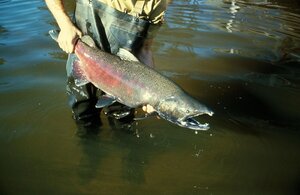~ecology-news-biolog | Bookmarks (486)
-
The bright and dark sides of Pacific salmon biotransport: Study tracks migration trends over 40 years
Each year, millions of Pacific salmon make a grand journey from the ocean to their freshwater...
-
Stressed bees make pessimistic choices and may experience emotion-like states, new research suggests
Stressed bees are much more likely to make pessimistic choices and lack a buzz in life,...
-
Study reveals how parasites thrive by balancing specialization with exploiting diverse species communities
A single shift of a parasite from one host species to another can trigger catastrophic infectious...
-
Mexican jumping beans jump to safety in a dynamic world—light could influence how moth larvae avoid extreme heat
What makes Mexican jumping beans jump? New research from Binghamton University reveals that Mexican jumping bean...
-
Findings suggest that fungal mycelia can 'recognize' shapes
Can organisms without a brain still show signs of intelligence? Researchers at Tohoku University and Nagaoka...
-
A new toolbox to predict global change impact on wildlife
A new climate change prediction tool provides insight into population-level vulnerability to global change through combining...
-
Adding fall blooming plants may help both managed and wild bees in cities
There are nearly 4,000 native bee species in the United States, contributing to pollination in agricultural,...
-
Male locusts serve as parasols for females during egg laying in the hot sun
A team of entomologists at Center National de Lutte Antiacridienne's Mauritanian National Desert Locust Center has...
-
Documenting the impact of a fungal outbreak on a forest over half a century
An entomologist and his ecologist daughter have outlined the dramatic changes that have occurred over the...
-
Sperm whale departure linked to decline in jumbo squid population in Gulf of California
A PeerJ study has revealed a significant departure of sperm whales (Physeter macrocephalus) from the central...
-
Environmental protections account for around 10% of fish stocks on coral reefs, global study finds
New research from the University of Sydney shows that international conservation efforts account for approximately 10%...
-
Data analysis navigates lookalikes to try to pin down the true number of mouse lemur species
In some parts of the world, animals are going extinct before scientists can even name them....
-
How a common economic theory could help save endangered frogs
A common theory that guides financial investment strategies may be a handy tool to protect an...
-
Diverse forests better at capturing planet-warming carbon dioxide, study finds
Forests with a greater diversity of trees are more productive—potentially leading to greater efficiency in capturing...
-
Whale shark shipping collisions may increase as oceans warm, predict researchers
Global warming could increase the threat posed to whale sharks from large ships, according to a...
-
Asteroid that wiped out the dinosaurs may have led to the invention of 'ant agriculture'
The event that wiped out the dinosaurs wasn't all bad. The low-light environment caused by the...
-
Study of global primate populations reveals predictors of extinction risk
An international team of biologists, planetary scientists and conservationists has conducted a large-scale study of non-human...
-
Drier winter habitat impacts songbirds' ability to survive migration
A new study from researchers at the Smithsonian's National Zoo and Conservation Biology Institute (NZCBI) shows...
-
Improved water quality offsets in growing cities could protect Great Barrier Reef
New research shows how growing Queensland regions can learn from biodiversity and carbon offsetting efforts to...
-
Sentinel-2 data reveal significant seasonal variations in intertidal seagrass
With data from the Copernicus Sentinel-2 mission, researchers have revealed seasonal variations in intertidal seagrass across...
-
Genetic database shows some fungal crops became completely reliant on ants 27 million years ago
When humans began farming crops thousands of years ago, agriculture had already been around for millions...
-
The true global impact of species-loss caused by humans is far greater than expected, study reveals
The extinction of hundreds of bird species caused by humans over the last 130,000 years has...
-
Unique IDs for individual (digital) specimens from natural history museums streamline and future-proof science
The wealth of data hosted in natural history collections can contribute to finding a response to...
-
Study reveals oyster reefs once thrived along Europe's coasts—now they're gone
Oysters once formed extensive reefs along much of Europe's coastline—but these complex ecosystems were destroyed over...

























